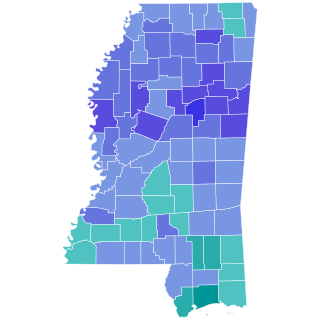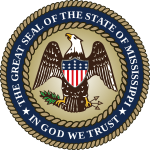
The 1978 United States Senate elections were held on November 7, in the middle of Democratic President Jimmy Carter's term. The 33 seats of Class 2 were contested in regular elections. Special elections were also held to fill vacancies.

The 1964 United States Senate elections were held on November 3. The 33 seats of Class 1 were contested in regular elections. Special elections were also held to fill vacancies. They coincided with the election of President Lyndon B. Johnson by an overwhelming majority, to a full term. His Democratic Party picked up a net two seats from the Republicans. As of 2023, this was the last time either party has had a two-thirds majority in the Senate, which allowed the Senate Democrats to override a veto, propose constitutional amendments, or convict and expel certain officials without any votes from Senate Republicans. However, internal divisions would have prevented the Democrats from having done so. The Senate election cycle coincided with Democratic gains in the House in the same year.

A general election was held in the U.S. state of Georgia on November 4, 2014. All of Georgia's executive officers were up for election as well as a United States Senate seat, all of Georgia's fourteen seats in the United States House of Representatives and all seats in both houses of the Georgia General Assembly. Primary elections were held on May 20, 2014. Primary runoffs, necessary if no candidate wins a majority of the vote, were held on July 22, 2014.

The 1991 Mississippi gubernatorial election took place on November 5, 1991 to elect the Governor of Mississippi. Incumbent Democrat Ray Mabus unsuccessfully ran for reelection to a second term. This election marked the first time a Republican was elected Governor of Mississippi since Reconstruction, when Adelbert Ames won the office in 1873.

The 1987 Mississippi gubernatorial election took place on November 3, 1987 to elect the governor of Mississippi.

The 1983 Mississippi gubernatorial election took place on November 8, 1983, in order to elect the Governor of Mississippi. Incumbent Democrat William Winter was term-limited, and could not run for reelection to a second term. As of 2023, this is the last time that Hinds County has voted for the Republican candidate.

The 1979 Mississippi gubernatorial election took place on November 6, 1979, in order to elect the Governor of Mississippi. Incumbent Democrat Cliff Finch was term-limited, and could not run for reelection to a second term. As of 2020, this was the most recent election in which a Democrat won over 60 percent of the statewide vote in a gubernatorial election in the state.

The 1967 Mississippi gubernatorial election took place on November 7, 1967, in order to elect the Governor of Mississippi. Incumbent Democrat Paul B. Johnson Jr. was term-limited, and could not run for reelection to a second term.

The 1963 Mississippi gubernatorial election took place on November 5, 1963, in order to elect the Governor of Mississippi. Incumbent Democrat Ross Barnett was term-limited, and could not run for reelection to a second term.

The 1959 Mississippi gubernatorial election took place on November 3, 1959, in order to elect the Governor of Mississippi. Incumbent Democrat James P. Coleman was term-limited, and could not run for reelection to a second term. As was common at the time, the Democratic candidate ran unopposed in the general election; therefore, the Democratic primary was the real contest, and winning the primary was considered tantamount to election.

The 1955 Mississippi gubernatorial election took place on November 8, 1955, in order to elect the Governor of Mississippi. Incumbent Democrat Hugh L. White was term-limited, and could not run for reelection to a second term. As was common at the time, the Democratic candidate ran unopposed in the general election, so therefore the Democratic primary was the real contest, and winning the primary was considered tantamount to election. This election was the first Mississippi gubernatorial election since 1931 that the winner of the gubernatorial election was of a different party than the incumbent president.

The 1947 Mississippi gubernatorial election took place on November 4, 1947, to elect the governor of Mississippi. Incumbent Democrat Fielding L. Wright, who had succeeded to the governorship a year prior following the death of Thomas L. Bailey, ran for election to a first full term.

The 1943 Mississippi gubernatorial election took place on November 2, 1943 to elect the Governor of Mississippi. Incumbent Democrat Paul B. Johnson Sr. was term-limited, and could not run for reelection to a second term. As was common at the time, the Democratic candidate ran unopposed in the general election so therefore the Democratic primary was the real contest, and winning the primary was considered tantamount to election.

The 1939 Mississippi gubernatorial election took place on November 7, 1939, in order to elect the Governor of Mississippi. Incumbent Democrat Hugh L. White was term-limited, and could not run for reelection to a second term. As was common at the time, the Democratic candidate ran unopposed in the general election so therefore the Democratic primary was the real contest, and winning the primary was considered tantamount to election.

The 1935 Mississippi gubernatorial election took place on November 5, 1935, in order to elect the Governor of Mississippi. Incumbent Democrat Martin S. Conner was term-limited, and could not run for reelection to a second term. As was common at the time, the Democratic candidate ran unopposed in the general election; therefore, the Democratic primary was the real contest, and winning the primary was considered tantamount to election.

The 1931 Mississippi gubernatorial election took place on November 3, 1931, in order to elect the Governor of Mississippi. Incumbent Democrat Theodore G. Bilbo was term-limited, and could not run for reelection to a second term. As was common at the time, the Democratic candidate ran unopposed in the general election, so therefore the Democratic primary was the real contest, and winning the primary was considered tantamount to election.

The 1927 Mississippi gubernatorial election took place on November 8, 1927, in order to elect the Governor of Mississippi. Incumbent Democrat Dennis Murphree, as he had not served a full term, was eligible for and ran for election. As was common at the time, the Democratic candidate ran unopposed in the general election; therefore the Democratic primary was the real contest, and winning the primary was considered tantamount to election.

The 1923 Mississippi gubernatorial election took place on November 6, 1923, in order to elect the Governor of Mississippi. Incumbent Democrat Lee M. Russell was term-limited, and could not run for reelection to a second term. As was common at the time, the Democratic candidate ran unopposed in the general election so therefore the Democratic primary was the real contest, and winning the primary was considered tantamount to election.

The 1903 Mississippi gubernatorial election took place on November 3, 1903, in order to elect the Governor of Mississippi. Incumbent Democrat Andrew H. Longino was term-limited, and could not run for reelection to a second term.
There were three special elections to the United States Senate in 1941 during the 77th United States Congress.






















